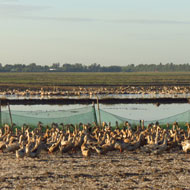
RVC explores virus spread in South East Asia
Traditional farming using free-grazing ducks in Vietnam has ‘unwittingly provided a perfect system’ for the spread of avian influenza, new research by the RVC has shown.
A further study suggests the trade in Vietnamese free-grazing ducks for food consumption could be responsible for spreading avian influenza to neighbouring countries in South East Asia.
Highly pathogenic avian influenza was first introduced to Vietnam in 2003 and has circulated in the country’s poultry ever since. Free-grazing ducks are central to the country’s traditional farming methods, whereby large flocks are transported to rice paddy fields to prepare the land after harvest and provide natural fertiliser.
A team led by Dr Dirk Pfeiffer at the RVC, found that one third of the flocks they investigated were positive for influenza A virus.
They used quantitative analysis to find out how flocks of thousands of birds come into close contact with one another. Key issues include the fact that ducks infected with avian influenza are asymptomatic. Their transport around the country also brings them into contact with many domestic bird populations, most commonly poultry.
Their findings have been published in the PLOS ONE journal.
A separate but related piece of research found that large numbers of live ducks are being sent to Cambodia and China for consumption. The free-grazing duck system is responsible for significant risk of cross-border spread of disease, particularly avian influenza.
This is made worse by ‘duck yards’, which are used as hubs in the northbound trade of ducks into China. Individuals from different flocks are brought together before being exported, which increases the risk of the virus spreading.
Professor Pfeiffer said free-grazing duck farming “has now been proven to play a key role in the continued presence of highly pathogenic avian influenza virus in the region.”
The findings, he added, will be “instrumental” in helping the Vietnamese Ministry of Agriculture and veterinary services in South East Asia to tackle avian influenza. They will also inform risk assessment models of influenza virus spread.
Image courtesy of the RVC



 The Veterinary Medicines Directorate (VMD) is inviting applications from veterinary students to attend a one-week extramural studies (EMS) placement in July 2026.
The Veterinary Medicines Directorate (VMD) is inviting applications from veterinary students to attend a one-week extramural studies (EMS) placement in July 2026.